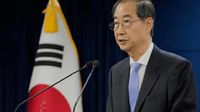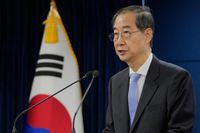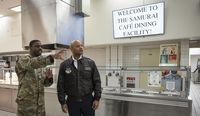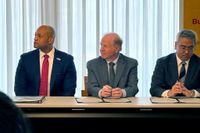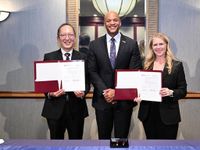SEOUL — Maryland Governor Wes Moore met with South Korea’s acting president, Han Duck-soo, on Wednesday, April 16, 2025, during a breakfast meeting at a Four Seasons hotel in Seoul. This encounter marked a significant moment in Moore’s three-day trade trip to South Korea, where he aimed to bolster economic ties and promote Maryland’s growing industries.
During the one-hour meeting, the two leaders discussed the importance of mutual support between their countries, particularly in light of the ongoing threats South Korea faces from its neighbors. Moore emphasized his economic growth agenda, which he is championing during his international travels. Han highlighted the critical need for continued support from the United States, underlining that the stability of South Korea relies heavily on maintaining a strong partnership with the U.S.
“He just really wanted to share how important that U.S.-South Korean relationship was,” Moore recounted after the meeting. “The stability of South Korea, in many ways, is reliant on making sure that the United States stays a strong and stable partner.”
Prior to his visit to South Korea, Moore spent four days in Japan promoting Maryland’s burgeoning quantum computing industry to Japanese investors. However, the trip was overshadowed by President Trump’s fluctuating tariff policies, which raised concerns among business leaders and officials about the unpredictability of trade relations.
On April 14, 2025, Peter Chapman, the executive chairman of IonQ, signed an agreement with Japan’s National Institute of Advanced Industrial Science and Technology, marking a significant step for Maryland’s aspirations to become a leader in quantum computing. Moore expressed his hope to make Maryland “the capital of Quantum,” emphasizing the importance of diversifying the state’s economy.
“It’s gonna be really good when it comes to Maryland’s larger contribution to the world,” Moore stated, referring to the potential of quantum computing technology to revolutionize various fields, including medicine and artificial intelligence.
However, on Tuesday morning, Trump’s announcement of possible new tariffs on computer chips and semiconductors created a ripple of uncertainty. Moore described the situation as “deeply troubling,” noting that the lack of consistent trade policy complicates international relations and deal-making.
Despite these challenges, Moore continued his mission in Asia, meeting with executives from companies such as Hitachi and Terumo Group, both of which have significant investments in Maryland. Hitachi is currently constructing a railcar manufacturing facility in Hagerstown, while Terumo Group is the largest Asian-headquartered company in the state.
While in Japan, Moore also announced an expansion of the academic and cultural exchange program between Salisbury University and the Japan Study Abroad Foundation. This initiative aims to enhance existing study abroad programs, allowing students from approximately 50 Japanese colleges and universities to study at Salisbury University. The partnership is expected to generate significant economic benefits, with an estimated $258,680 annually contributed to the local economy through tuition and other expenses.
“Salisbury University is one of the great treasures of our state,” Moore said, highlighting the importance of nurturing future leaders through educational partnerships. The program is projected to bring 10 visiting students to Salisbury University in its initial two years, contributing to a total economic impact of approximately $4 million over the partnership’s duration.
As Moore concluded his visit to Japan, he prepared for his next engagements in South Korea, where he is scheduled to sign two more cooperation agreements with IonQ. He will remain in South Korea through the end of the week, participating in investment seminars and touring an aerospace company.
Back in Maryland, the political landscape continues to evolve. The Maryland General Assembly recently adjourned for the year after passing 878 pieces of legislation, and Governor Moore has until May 27, 2025, to sign or veto these bills. Meanwhile, a recent poll from the University of Maryland, Baltimore County, revealed that residents who believe Baltimore City and Baltimore County are heading in the wrong direction outnumber those who think they are on the right track.
Additionally, Maryland is allocating $1.7 million for environmental projects in the Back River and Patapsco River watersheds, which encompass several counties. This investment underscores the state’s commitment to addressing environmental concerns and supporting community-led initiatives.
In a related matter, Maryland’s utility regulator is investigating the safety of the region’s gas infrastructure after a Baltimore Gas and Electric inspector was caught falsifying inspection reports. This raises questions about the safety standards that have been upheld in the region.
Moreover, Johns Hopkins University revealed that 37 graduate students and recent graduates have been affected by federal visa revocations, highlighting ongoing challenges faced by international students in the U.S.
As the week progresses, Governor Moore’s trade mission and the legislative developments in Maryland reflect a dynamic interplay of local and international issues, with implications for the state’s economy and its global partnerships.
